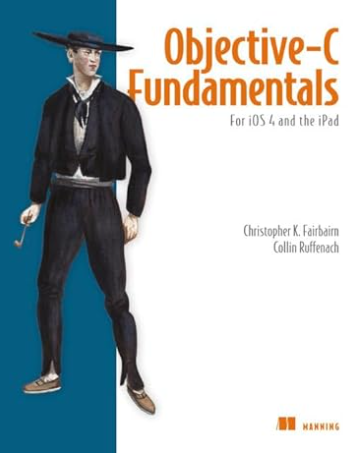- Регистрация
- 27 Авг 2018
- Сообщения
- 38,732
- Реакции
- 585,572
- Тема Автор Вы автор данного материала? |
- #1

ОПИСАНИЕ:
Summary
Objective-C Fundamentals is a hands-on tutorial that leads you from your first line of Objective-C code through the process of building native apps for the iPhone using the latest version of the SDK. You'll learn to avoid the most common pitfalls, while exploring the expressive Objective-C language through numerous example projects.
About the Technology
The iPhone is a sophisticated device, and mastering the Objective C language is the key to unlocking its awesome potential as a mobile computing platform. Objective C's concise, rich syntax and feature set, when matched with the iPhone SDK and the powerful Xcode environment, offers a developers from any background a smooth transition into mobile app development for the iPhone.
About the Book
Objective-C Fundamentals guides you gradually from your first line of Objective-C code through the process of building native apps for the iPhone. Starting with chapter one, you'll dive into iPhone development by building a simple game that you can run immediately. You'll use tools like Xcode 4 and the debugger that will help you become a more efficient programmer. By working through numerous easy-to-follow examples, you'll learn practical techniques and patterns you can use to create solid and stable apps. And you'll find out how to avoid the most common pitfalls.
No iOS or mobile experience is required to benefit from this book but familiarity with programming in general is helpful.
Purchase of the print book comes with an offer of a free PDF, ePub, and Kindle eBook from Manning. Also available is all code from the book.
What's Inside
- Objective-C from the ground up
- Developing with Xcode 4
- Examples that work unmodified on iPhone
Table of Contents
PART 1 GETTING STARTED WITH OBJECTIVE-C
- Building your first iOS application
- Data types, variables, and constants
- An introduction to objects
- Storing data in collections
PART 2 BUILDING YOUR OWN OBJECTS
- Creating classes
- Extending classes
- Protocols
- Dynamic typing and runtime type information
- Memory management
PART 3 MAKING MAXIMUM USE OF FRAMEWORK FUNCTIONALITY
- Error and exception handling
- Key-Value Coding and NSPredicate
- Reading and writing application data
- Blocks and Grand Central Dispatch
- Debugging techniques
СКАЧАТЬ:



